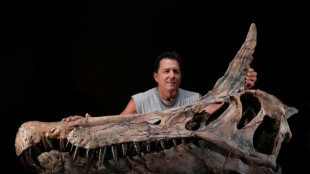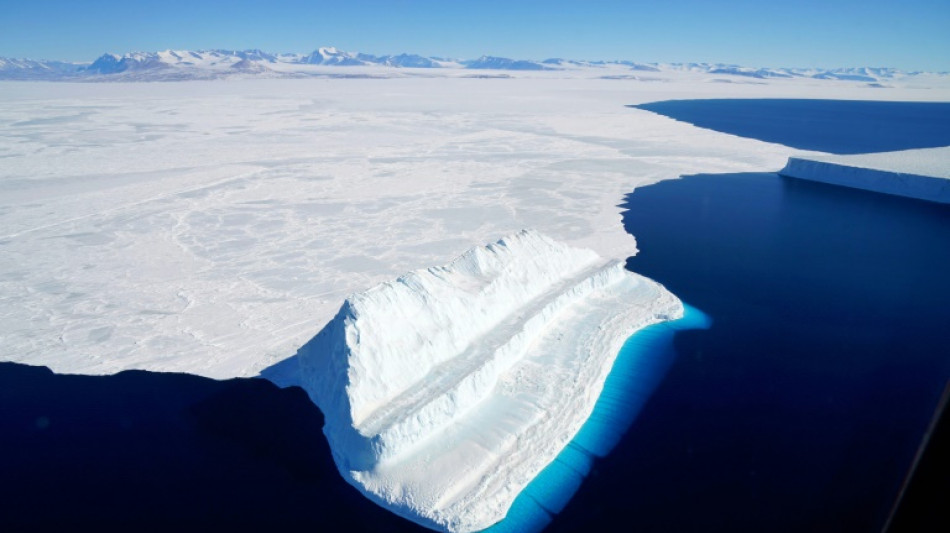
-
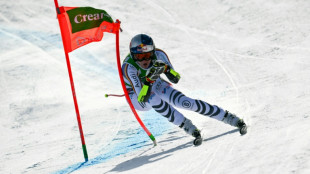 Germany's Aicher wins women's super-G in Soldeu
Germany's Aicher wins women's super-G in Soldeu
-
Fight against terror: Trump threatens Tehran's mullahs

-
 US and Israel launch strikes on Iran, explosions reported across region
US and Israel launch strikes on Iran, explosions reported across region
-
Iran's Khamenei: ruthless revolutionary at apex of Islamic republic

-
 In Iran attack, Trump seeks what he foreswore -- regime change
In Iran attack, Trump seeks what he foreswore -- regime change
-
Climate change forces facelift for Michelangelo masterpiece
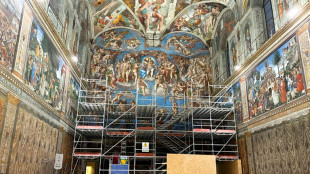
-
 Trump says US aims to destroy Iran's military, topple government
Trump says US aims to destroy Iran's military, topple government
-
Acosta wins season-opening MotoGP sprint after Marquez penalty

-
 US and Israel launch strikes against Iran
US and Israel launch strikes against Iran
-
Afghanistan says Pakistan fighter jet down as cross-border strikes flare

-
 Kerr says only '85 percent' fit for Women's Asian Cup
Kerr says only '85 percent' fit for Women's Asian Cup
-
Messi's Inter Miami to visit White House: US media

-
 Thunder beat Nuggets in overtime on Gilgeous-Alexander's return
Thunder beat Nuggets in overtime on Gilgeous-Alexander's return
-
'It's surreal': Zimbabwe superfans revel in unexpected ride to India

-
 New 'Wuthering Heights' film unleashes fresh wave of Bronte-mania
New 'Wuthering Heights' film unleashes fresh wave of Bronte-mania
-
US backs Pakistan's 'right to defend itself' after strikes on Afghanistan

-
 Bezzecchi beats Marquez to pole at season-opening Thailand MotoGP
Bezzecchi beats Marquez to pole at season-opening Thailand MotoGP
-
OpenAI strikes Pentagon deal with 'safeguards' as Trump dumps Anthropic

-
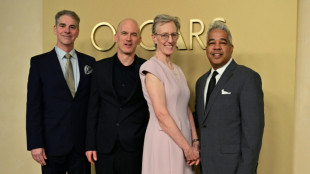 Oscar-nominated 'F1' sound engineers recreate roar of racetrack
Oscar-nominated 'F1' sound engineers recreate roar of racetrack
-
15 dead as cash-packed military plane crashes in Bolivia

-
 Costa Rica's Grynspan pledges reform in bid for UN chief job
Costa Rica's Grynspan pledges reform in bid for UN chief job
-
Former All Black Bridge hailed for influence at Western Force

-
 'Sinners' vampires inspired by animals, says Oscar hopeful makeup artist
'Sinners' vampires inspired by animals, says Oscar hopeful makeup artist
-
For Oscar nominee Stellan Skarsgard, good cinema is like slow food

-
 'Brilliant industry' sees Reds down Highlanders in Super Rugby
'Brilliant industry' sees Reds down Highlanders in Super Rugby
-
Neil Sedaka, US singer and songwriter, dies age 86

-
 Paramount acquires Warner Bros. in $110 bn mega-merger
Paramount acquires Warner Bros. in $110 bn mega-merger
-
Rosenior eyes extended stay to stabilise Chelsea

-
 Spurs struggling physically admits Tudor
Spurs struggling physically admits Tudor
-
Lens held by Strasbourg in blow to Ligue 1 title chances

-
 NFL salary cap passes $300 mn for first time
NFL salary cap passes $300 mn for first time
-
Wolves secure rare win to dent Villa's bid for Champions League place

-
 Oil prices jump on Iran attack fears while US stocks fall
Oil prices jump on Iran attack fears while US stocks fall
-
Two dead, dozens injured as tram derails in Milan

-
 Trump tells US govt to 'immediately' stop using Anthropic AI tech
Trump tells US govt to 'immediately' stop using Anthropic AI tech
-
Court orders Greenpeace to pay $345 mn to US oil pipeline company

-
 IAEA stresses 'urgency' to verify Iran's nuclear material
IAEA stresses 'urgency' to verify Iran's nuclear material
-
UN urges action to prevent full civil war in South Sudan

-
 Hackers steal medical details of 15 million in France
Hackers steal medical details of 15 million in France
-
Susan Sarandon praises Spain’s stance on Gaza

-
 Murray adamant size isn't everything despite losing Wales place
Murray adamant size isn't everything despite losing Wales place
-
Messi knocked down by fan in Puerto Rico pitch invasion

-
 Two killed, dozens injured as tram derails in Milan
Two killed, dozens injured as tram derails in Milan
-
O'Neill taken aback by Rangers boss Rohl's comments on Celtic

-
 Ukrainian, Slovak leaders hold call amid energy spat
Ukrainian, Slovak leaders hold call amid energy spat
-
French hard-left firebrand sparks row with 'antisemitic' Epstein jibe

-
 Ahmed, Jacks blast England to thrilling win over New Zealand
Ahmed, Jacks blast England to thrilling win over New Zealand
-
UK police arrest man after Churchill statue sprayed with graffiti
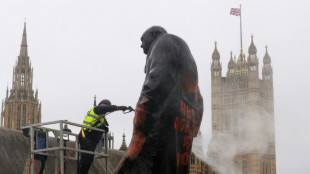
-
 Bill Clinton denies wrongdoing at grilling on Epstein ties
Bill Clinton denies wrongdoing at grilling on Epstein ties
-
Red Cross urges Afghanistan-Pakistan 'de-escalation'


How did life survive 'Snowball Earth'? In ponds, study suggests
Earth has not always been so hospitable to live. During several ice ages, the planet's surface was almost completely frozen over, creating what has been dubbed "Snowball Earth".
Liquid water appears to be the most important ingredient for life on any planet, raising the question: how did anything survive such frosty, brutal times?
A group of scientists said Thursday that they had found an astonishing diversity of micro-organisms in tiny pools of melted ice in Antarctica, suggesting that life could have ridden out Snowball Earth in similar ponds.
During the Cryogenian Period between 635 and 720 million years ago, the average global temperature did not rise above -50 degrees Celsius (-58 Fahrenheit). The climate near the equator at the time resembled modern-day Antarctica.
Yet even in such extreme conditions, life found a way to keep evolving.
Fatima Husain, the lead author of a new study published in Nature Communications, told AFP there was evidence of complex life forms "before and after the Cryogenian in the fossil record".
"There are multiple hypotheses regarding possible places life may have persisted," said Husain, a graduate student at the Massachusetts Institute of Technology.
Perhaps it found shelter in patches of open ocean, or in deep-sea hydrothermal vents, or under vast sheets of ice.
The tiny melted ice pools that dotted the equator were another proposed refuge.
These ponds could have been oases for eukaryotes, complex organisms that eventually evolved into multicellular life forms that would rise to dominate Earth, including humans.
- Could aliens be hiding in ponds? -
Melted ice ponds still exist today in Antarctica, at the edges of ice sheets.
In 2018, members of a New Zealand research team visited the McMurdo ice shelf in east Antarctica, home to several such pools, which are only a few metres wide and less a metre deep.
The bottom of the ponds are lined with a mat of microbes that have accumulated over the years to form slimy layers.
"These mats can be a few centimetres thick, colourful, and they can be very clearly layered," Husain said.
They are made up of single-celled organisms called cyanobacteria that are known to be able to survive extreme conditions.
But the researchers also found signs indicating there were eukaryotes such as algae or microscopic animals.
This suggests there was surprising diversity in the ponds, which appears to have been influenced by the amount of salt each contained.
"No two ponds were alike," Husain said. "We found diverse assemblages of eukaryotes from all the major groups in all the ponds studied."
"They demonstrate that these unique environments are capable of sheltering diverse assemblages of life, even in close proximity," she added.
This could have implications in the search for extraterrestrial life.
"Studies of life within these special environments on Earth can help inform our understanding of potential habitable environments on icy worlds, including icy moons in our Solar System," Husain said.
Saturn's moon Enceladus and Jupiter's Europa are covered in ice, but scientists increasingly suspect they could be home to simple forms of life, and several space missions have been launched to find out more about them.
O.Johnson--AMWN

